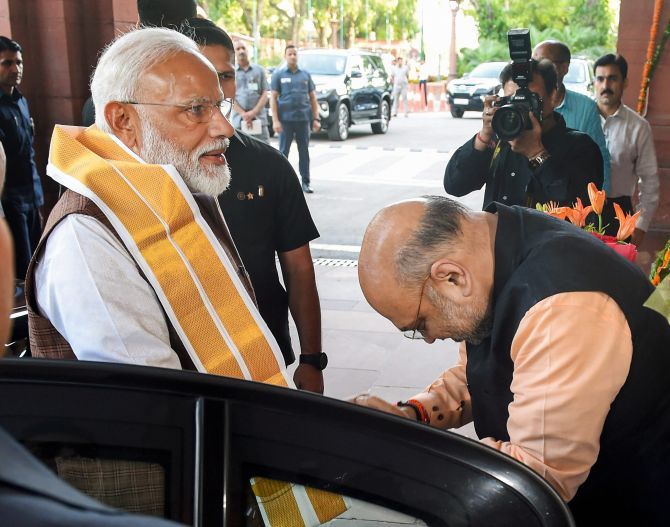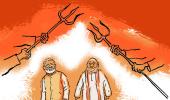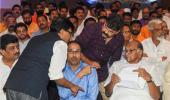While it took the Congress nearly a half century to earn the hatred of other political outfits, the BJP appears set to reach there in around six years, says Arun Bhatnagar, former secretary to the GoI.

A government of the Shiv Sena-Nationalist Congress Party-Congress having become a reality in Maharashtra, several questions arise about national politics in general and state politics, in particular.
An oft-repeated criticism of the seemingly disparate coalitions -- which appeared in the aftermath of a steadily declining Congress and has carried on in the era of Bharatiya Janata Party domination -- is that they are hardly ever able to offer stable governance because of their inherent contradictions and internal dissensions.
However, the fact of the matter also is that the electoral performance of the BJP has, of late, not matched the expectations of its senior leadership and that this is beginning to lend credence to the view that coalition dispensations may actually suit the genius of a large and diverse nation better than one-party rule.
The ongoing economic slowdown under the BJP is being cited as a glaring example of inefficient management. This is taking its toll and no easy solutions are in sight. The decision to stay out of the RCEP has dented the country’s image.
The World Bank has slashed the economic growth forecast for India (one of Asia's largest economies) in the current fiscal year, after it grew at the slowest pace in six years because of a demand slump. According to the National Statistical Office, the GDP growth has fallen further to 4.5%, the lowest since March, 2013.
The political upheaval in Maharashtra leaves behind two significant impressions -- first, that the BJP stalwarts who kept projecting themselves as 'outsiders' to New Delhi have adapted to the capital city's culture with amazing speed and, secondly, (for want of a better term), of the BJP's Congressisation.
The BJP's style of functioning has contributed to its ally troubles which are currently evolving in poll-bound Jharkhand. The Congress has its high command and final decisions have always rested with the First Family. While the BJP does not have this kind of structure, there are only a few individuals who are involved in the ultimate decision-making in the saffron party.
Its Delhi-centric and often arrogant style has added fuel to Mumbai's long-standing grudge -- that the Centre tramples upon regional sentiments and ignores regional leaders.
The BJP's behaviour has been the same as the Congress of the 1980s. In Maharashtra, its approach in dealing with the major parties, to begin with the Shiv Sena and then the Nationalist Congress Party, was like that of the Congress, the essential difference being that while it took the Congress nearly a half century to earn the hatred of other political outfits, the BJP appears set to reach there in around six years.
There are similarities between the new BJP and the old Congress, a crucially important one being the near-complete disregard towards the local units. It is believed that many in the Maharashtra BJP, such as Eknath Khadse, were averse to what eventually turned out to be the party's nemesis, such as recklessly inducting members of other formations or engineering defections.
As for the Shiv Sena, this cadre-based entity probably thinks that, notwithstanding the ideological differences, its sensitivities are likely to be more acknowledged by the NCP and the Congress than by the BJP.
In any event, the stage is set for a political experiment that could point to a more tolerant style of political rule in the country. The coalition in Maharashtra offers a potential alternative to the BJP’s centralised manner of functioning.
If the BJP-Sena rupture does not exhibit signs of healing and remains in evidence when the first centenary of the RSS is observed in 2024-2025, then this would inevitably carry long-term implications and fundamentally affect the dimensions and dynamics of Hindutva politics for years to come.
The RSS neither appeared overly concerned about the BJP-Shiv Sena feud nor did its influence come into play. Was there more of a meeting of minds between the RSS and the Sena than between the RSS and the BJP in regard to the Maharashtra alliance?
It augurs well that the CM's position is held by the Sena supremo, Uddhav Thackeray, rather than him operating by means of some form of remote control. He belongs to the Chandraseniya Kayastha Prabhu community. The Congress is participating in the government instead of extending outside support.
An issue for serious thought is whether the coming together of the Shiv Sena and the NCP reflects an assertion of Maratha pride over the BJP's nationalist tone and utterances?
Clearly, the Maratha strongman, Sharad Pawar, who turns 79 on December 12, counts for something and is no pushover. A statement on the eve of the elections that 'we in Maharashtra follow the principles of Chhatrapati Shivaji, we don't bow down to the Delhi throne' caused a flutter and had the BJP recasting its strategy.
Pawar questioned the timing of a case being processed against him which coincided with the polls: 'The election process has started... people can understand the timing of the move...'
At that stage, with a Brahmin CM in office and aspiring for a second term, the BJP could ill-afford to take on the Maratha community, the expansion of whose empire in the mid-eighteenth century had occurred under the Peshwas -- Brahmin executives of the Chhatrapati -- who eventually became more powerful than the Chhatrapati at Satara.
The Peshwas granted semi-autonomy to the Maratha chieftains, the Scindias of Gwalior, the Holkars of Indore, the Gaekwars of Baroda, the Bhonsles of Nagpur and the Puars of Dhar and Dewas, who constituted the Maratha confederacy.
The influential Brahmin minister of this period was Nana Fadnavis, the dominant personality in the Peshwa's court till his death in 1800. The East India Company called him the 'Maratha Machiavelli' -- a title sometimes applied to Sharad Pawar in much later times.
To this day, the disempowerment of its rulers by Brahmin ministers is said to rankle the Maratha fraternity.
The impressive majority with which the BJP was returned to power earlier this year enhanced domestic confidence and India's international standing. As it happens, both stand eroded to some extent.
South Block (where the PMO and the ministry of external affairs are located) has chosen not to dwell very much upon their worries over the regime change in Sri Lanka that has placed the Rajapaksas in full control or about how India's progressive shift towards majoritarian politics is being viewed in world capitals.
China will remain the main foreign policy challenge for India whose establishment is going out of its way to repair the rocky relationship with the Rajapaksa family who are unlikely to countenance interference on the Tamil question.
It bears repetition that India's democratic and liberal record has been a source of strength abroad and has opened many doors for her diplomats, especially in the West.
Opting for a secular, parliamentary structure after Independence in 1947, drafting a Constitution famously described by Granville Austin (1927-2014), the eminent American historian, as a 'modernising force' and adopting positions such as its stance on apartheid, have given India a certain ethical stature that has, in turn, enabled it to punch above its weight in global affairs.
India cannot risk losing this capital, even as the democracy-deficit in how Kashmir has been handled is being closely watched in the US and Europe. Can the country occupy the moral high ground were Sri Lanka to be advised about equality and justice for Tamils?
Visiting heads of State and government have expressed their opinions. In early October, 2019, the Bangladesh prime minister said in New Delhi: 'We should move beyond the majority-minority mindset; pluralism has been a strength of South Asian countries'.
Soon afterwards, the Dutch monarch observed at a State banquet in his honour: 'Our wish is that, for future generations too, India will be a country where there is room for all Indians, whatever their belief, origin or position in society... a country in which everyone can make their voice heard, from the peaks of the Himalayas to the coastal plains of Kerala'.
In November, 2019, German Chancellor Angela Merkel cautioned during a visit to India that 'the situation now for the people (in Kashmir) is not good and not sustainable. This has to be improved for sure'. The Finnish foreign minister has said that the diplomatic corps should be allowed to visit Kashmir.
The India-Bangladesh bilateral relationship has been called a template for New Delhi's ties with neighbours.
For this, substantial credit redounds to Prime Minister Sheikh Hasina who has countered radical Islamic ideologies at home for quite some time. But Dhaka also has very cordial relations with Beijing, is a partner in the Xi Jinping-led Belt and Road Initiative and is a major recipient of Chinese military assistance.
In the prevailing situation in South Asia, it is expedient for New Delhi to acknowledge China's economic clout with Bangladesh and shape its own ties with this in mind. For its part, China seems to have recognised that the decisive victory of the Indian armed forces in the then East Pakistan in 1972 signalled their having recouped from the military defeat of 1962.
Beijing's response was to invest in Pakistan, settle the boundary question and, over the years, nurture an extremely deep relationship with Islamabad.
In the 'neighbourhood first' policy, New Delhi would also need to direct skilful attention towards Kathmandu where the government is leaving no stone unturned to elevate the ties with China, as part of its aim to achieve strategic autonomy.
President Xi Jinping's visits to India and Nepal were short -- heavy on optics in India and heavy on impact in Nepal. This was the first visit to Nepal of the top Chinese leadership after the then premier Jiang Zemin in 1996.
Hopefully, the soon-to-be known outcome of the Jharkhand elections will afford a basis for assessing whether state polls can still be won by the BJP on the strength of Modi's persona and appeal alone. The Madhya Pradesh, Chhattisgarh and Rajasthan results went the other way and Haryana has failed to provide much satisfaction, not to mention the by-poll defeats in West Bengal.
The coalition in Maharashtra can be expected to stay afloat for some time, if only for the reason that its collapse may herald the BJP's return, a dreaded prospect for the alliance partners.
Ironically enough, it is a beleaguered Indian National Congress -- whose leadership played but a small role in the campaigning -- that has emerged a beneficiary and ought to detect a window of opportunity for continuing the process of recovery. It cannot only look for the ministerial prizes of electoral success.
For the Grand Old Party, it could be now or never.
Arun Bhatnagar is a former member of the IAS and retired as secretary, Government of India. He can be contacted at news@rediff.co.in.











 © 2025
© 2025